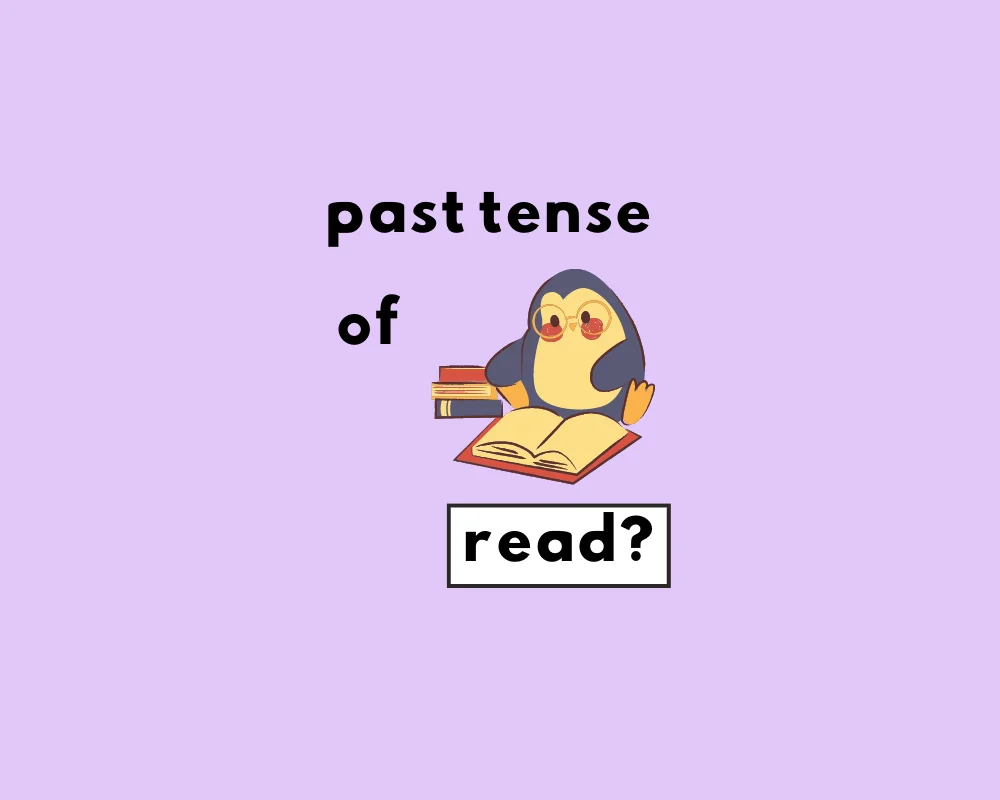
Contents
Toggle
What’s the past tense of “read”?
| present | past | future | |
| simple | I read | I read | I will read |
| continuous | I am reading | I was reading | I will be reading |
| perfect | I have read | I had read | I will have read |
| perfect continuous | I have been reading | I had been reading | I will have been reading |
The past tense of read is read. In fact, the present tense, past tense and past participle forms of read are all read!
How can all three ‘read’s‘ be the same? How can you read the word read so many times in only a couple of sentences? Anything is possible, dear readers.
The difference is in how we pronounce each tense. Does your internal reading voice stick to just one? There are two ways to pronounce read:
- The past tense (and past participle form) we pronounce ‘red’, as in the colour.
- In the present tense, ‘read’ sounds liked ‘reed‘ (rhymes with seed or feed).
Now, go back and re-read that first part out loud!
Conjugations of ‘read’
The verb, read, means, “to repeat aloud the words of written or printed matter”. It can also mean “to have the ability to examine and understand the meaning of written or printed matter”.
Read sounds similar to verbs that use two forms in the present and past, though unlike those listed below ‘read’ keeps the same spelling:
| base verb | past tense | past participle |
| lead | led | led |
| speed | sped | sped |
| bleed | bled | bled |
| read | read* | read* |
| breed | bred | bred |
Is read a regular or irregular verb?
The past tense form of read is read. Read is an irregular verb because its past tense form does not end in -ed. The difference between regular and irregular verbs is:
Regular verbs end in –ed in their past tense forms. Irregular verbs end in something other than –ed.
Is read the past tense or past participle?
Read is both the past tense and the past participle form of read. If both forms are spelled the same way, what’s the difference between the past tense and past participle?
The difference is that the past tense is used to express something that happened in the past, while the past participle is a verb form that uses an auxiliary verb to form a compound verb. An example of the past participle read in a compound verb is had read. Here, it’s combined with the auxiliary verb had. Read and had read are both in the past tense—past simple and past perfect, respectively. Had read would be used to indicate that reading was done before some other point in the past. In other words, it indicates the order of events.
Compare these sentences:
I read about cats the other day.
I had read about cats, but I still wasn’t prepared to own one.
Still unsure about participles? Don’t fret— you can learn more about them here.
“Read”, used in sentences (present/past tense)
| Examples: “read“, in the present tense |
| Are you reading the same magazine? He can’t read body language. I have already read this book ten times! She has a nice pair of reading glasses. They held a script reading for a new TV series. |
| Examples: “read“, in the past tense |
| I read an interesting article last night. She had read the textbook long before the semester started. When he was a kid, he would only ever read comic books. I had my palm read at the festival. |
Origin of the verb ‘read’
From etymology online on read (v.):
Middle English reden, ireden, “to counsel, advise,” also “to read,” from Old English rædan, gerædan (West Saxon), redan, geredan (Anglian) “to advise, counsel, persuade; discuss, deliberate; rule, guide; arrange, equip; forebode; to read (observe and apprehend the meaning of something written), utter aloud (words, letters, etc.); to explain; to learn through reading; to put in order.”
This is reconstructed to be from Proto-Germanic *redan, source also of Old Norse raða, Old Frisian reda, Dutch raden, Old High German ratan, German raten “to advise, counsel, interpret, guess,” from PIE root *re– “to reason, count.”
Practice questions: verb forms of ‘read’
| Questions | Answer options: |
| 1. True or false: “Read” is a regular verb. | a. true b. false |
| 2. True or false: Regular verbs end in “ed” to denote the past. | a. true b. false |
| 3. True or false: The verb, “read” looks the same in the present and past. | a. true b. false |
| 4. Which tense is this sentence in: I’ve read that book! | a. past b. present perfect c. past perfect |
| 5. The sentence is in which tense: I will be reading Emma by Jane Austen in English class. | a. future continuous b. present continuous c. past continuous |
| 6. Choose the form of ‘read’ to complete the sentence: I ___ a fascinating article online earlier. | a. will read b. have read c. read |
Answers
- b
- a
- a
- b
- a
- c
Read about other irregular verbs
- What’s the Past Tense of Begin?
- What’s the Past Tense of Lose?
- What is the Past Tense of Teach?
- What’s the Past Tense of Read?
- What’s the Past Tense of Seek? Seeked or Sought?
- What’s the Past Tense of Buy? Brought or Bought?
- Take, Took, or Taken: What’s the Correct Past Tense of Take?
Sources
- Definition of read.
- Etymology online, origin of read.










